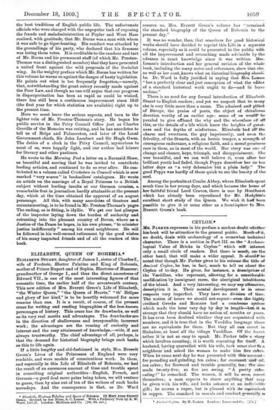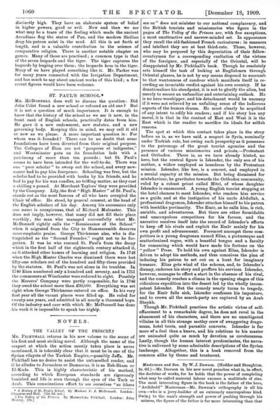CEYLON.*
Mu'. PARKER empresses in his-preface. a modest doubt whether' hisibook -will be attractive-to the general public. Atuolfrof it, no doubt, deals with archaeology of a somewhat teelinieal character. There is a section hr Part III. on the "'Archaeo- logical Value of Bricks in Ceylon' which will • interest wily a- small circle of readers. But there. is- smelt, ow the' other :hand, that will make a wider- appeal'. It, aliorticthe noted. that .though Mr. Parker gives to his- volume-the tithe of Ancient Ceylon, he _hae, in fact,. much to tell ea. about tf3e Geylen of to-day. He gives, for instance, a description, of - the Vaeddhae, who represent,. allowing for a. considerable medificsationhy immigrant mess, the aboriginal inhabitants of the island. And a very interesting, we may, any attienetive, description it is. Their mental development is in some respects • very imperfect. They have no division. of -time. The notion of hours we should nob expect —Mar the highly civilised. Greeks and Romans had a - °umbrella system which made the hour vary day by da$ in. leargth-e-huttit is... strange that they should have no notion of_ months or years. It has even been doubted whether they are acquainted with numbers, and it is true that in the Vatddha language there are no equivalents for them., But they all can count in Sinhalese, at least' all the village Vaeddhas. Of the forest tribes iti 'not so easy to speak. Mr. Parker- fella- a 'story which inieltes counting ; it is worth repeating for itself. • A husband having quarrelled with his wife, took someticelb a neighbonr.b.nd . asked' the woman to make him fete es.' When he came next day he -was presented with thiceaccount for-pounding and- grinding, ten cakes ; for cocoanut. aiidi oil; ten cakes ; for firewood and tremble generally; ten;. the' rise made twenty-five; so five are Owing. " pretty' dike- eating!" he remarked. The women, it will' be seen; assert themselves ; a man expects to share anything 'that may be given-with his wife, and looks askance at an ilvisitle- gift; he scorns a rupee, but is pleased with its equie-alent in copper. The standard in morals and conduct .genemily is-
. .
ancient Ceylon. By H. Parker. London; Lnzac and Co. [a's.]
distinctly high. They have an elaborate system of belief in higher powers, good or evil. Now and then we see what may be a trace of the feeling which made the ancient Arcadians flog the statue of Pan, and the modem Sicilian drag his patron saint in the mud. All this is set forth at length, and is a valuable contribution to the science of comparative religion. There is another notable chapter on games. Many of these are practised ; a common type is that of the seven leopards and the tiger. The tiger captures the leopards by leaping over them ; the leopards hens in the tiger. Many of us have played something like it. Mr. Parker was for many years connected with the Irrigation Department, and has much to say about ancient works of this kind ; a few recent figures would have been welcome.



















































 Previous page
Previous page